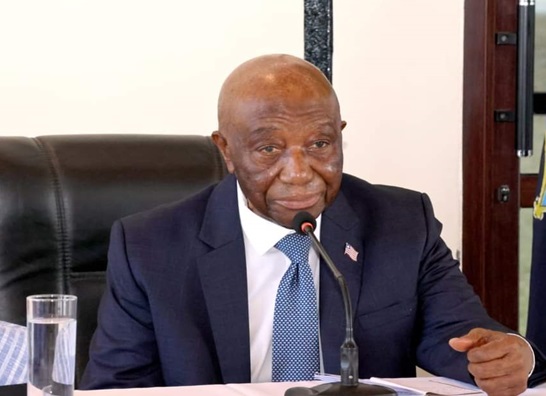MONROVIA – As concerns mount over a potential surge in the price of 5% Broken Indian Parboiled Rice (IR64), President Joseph N. Boakai has stepped in to address the issue head-on. Amidst a series of discussions between the Minister of Commerce, rice importers, and the business community, the President has called for a pivotal meeting scheduled for tommorrow, May 21st, 2024. The objective? To engage stakeholders in a dialogue aimed at finding viable solutions to alleviate the impending price hike.
Rice holds a central position in the diets of millions across the globe, serving as a staple food source for numerous communities. In regions where rice consumption is particularly high, even the slightest fluctuations in its price can have profound implications, affecting not only household budgets but also broader economic stability.
The impending increase in the price of 5% Broken Indian Parboiled Rice has sparked widespread concern among both consumers and businesses alike. Recognizing the urgency of the situation, President Boakai has taken proactive measures to convene a meeting that brings together key players from the rice import sector and the business community.
The decision to host this gathering underscores the government’s commitment to fostering collaboration and seeking pragmatic solutions to pressing challenges. By providing a platform for dialogue and exchange, President Boakai aims to harness collective insights and expertise in charting a path forward that safeguards the interests of all stakeholders.
Importers, business leaders, and government officials alike are poised to engage in constructive discussions during the upcoming meeting. Among the topics likely to be on the agenda are the underlying factors contributing to the proposed rice price increase, potential mitigating strategies, and avenues for enhanced cooperation between the public and private sectors.
Central to these deliberations will be a focus on balancing the needs of consumers with the realities of market dynamics and supply chain intricacies. Finding the delicate equilibrium between ensuring affordability for households and maintaining viability for businesses presents a formidable challenge—one that demands innovative thinking and collaborative action.
In addition to addressing immediate concerns, the meeting represents an opportunity to explore longer-term measures aimed at bolstering food security and resilience in the face of future uncertainties. From promoting domestic production initiatives to enhancing trade partnerships, the discussions are poised to encompass a broad spectrum of strategies aimed at strengthening the rice sector’s resilience and sustainability.
As the world navigates complex economic realities and evolving global dynamics, proactive and inclusive approaches to problem-solving are more critical than ever. President Boakai’s decision to convene this high-level meeting reflects a commitment to responsive governance and the pursuit of solutions that prioritize the welfare of the people.
Ultimately, the success of the upcoming gathering will hinge on the willingness of all parties to engage earnestly, with a spirit of cooperation and pragmatism. By harnessing collective wisdom and leveraging the diversity of perspectives, stakeholders can chart a course that not only addresses the immediate challenge posed by the rice price increase but also lays the groundwork for a more resilient and inclusive future.
In conclusion, the May 21st meeting stands as a testament to the power of dialogue and collaboration in overcoming shared challenges and advancing common goals. In a time marked by uncertainty, such concerted efforts offer a beacon of hope, signaling the potential for meaningful progress and positive change.







